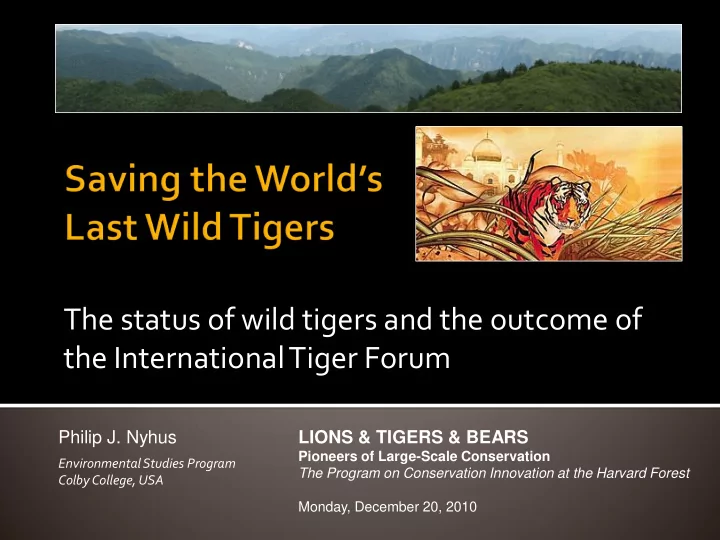

The status of wild tigers and the outcome of the International Tiger Forum Philip J. Nyhus LIONS & TIGERS & BEARS Pioneers of Large-Scale Conservation Environmental Studies Program The Program on Conservation Innovation at the Harvard Forest Colby College, USA Monday, December 20, 2010
Historic and Current Tiger Distribution
“In 2005 tigers occupied only 7.1% of their historical range. This represents a 92.9% range collapse over the last 150 years” “Setting Priorities for Tiger Conservation: 2005 – 2015” Sanderson, E.W., J. Forrest, C. Loucks, J. Ginsberg, E. Dinerstein, J. Seidensticker, P. Leimgruber, M. Songer, A. Heydlauff, T. O’Brien, G. Bryja, S. Klenzendorf, and E. Wikramanayake In Tigers of the World R. Tilson and P. Nyhus, eds.
Coggins, C. 2010. In Tilson and Nyhus (eds.) Tigers of the World: The Biology, Politics, and Conservation of Panthera tigris (2 nd Ed.) Amsterdam: Elsevier
Can we restore wild populations of South China tigers? International collaboration among State Forestry Administration of China and South China Tiger Office (R. Tilson & Minnesota Zoo with Colby College and others)
110°E 115°E 120°E Rapid assessments China 30°N Habitat evaluation Hubei Sheng ( ! Wuhan Houhe NNR 1 2 30°N Ecological Hupingshan NNR Wuyishan NNR 3 Nanchang Badagongshan NNR ! ( Jiangxi 6 Zixi Changsha 7 restoration 10 9 ! ( ! Wuyishan NNR 8 Zhushuqiau NNR Matoushan Fujian Hunan Sheng Jiangxi Fuzhou ( ! Fujian 25°N Mangshan NNR 4 25°N 5 Nanling NNR Guangdong Sheng Guangzhou ( ! Legend ( ! Capital Study Area $ Province 20°N 0 100 200 km 110°E 115°E
Recommend
More recommend